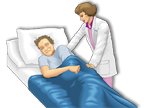|
As you pass middle age, you will likely have more difficulty
experiencing deep, undisturbed sleep. Many elderly people
also go to bed and wake up earlier than others, which has
been blamed on one of the primary hormones regulating the
internal sleep clock: melatonin production in the body. In
an attempt to normalize their sleep patterns, many of the
elderly take melatonin in its supplement form.
Researchers
recently investigated the link between sleep patterns and
melatonin secretion in the bodies of young and older individuals.
They monitored 15 older men and women (averaging 68 years
of age) and 33 men in their twenties. Melatonin levels in
each person's body were monitored during three nights of sleep.
The results appear in the American Journal of Physiology:
Endocrinology and Metabolism.
 Average waking times and bedtimes of the seniors were one
hour earlier than those of the younger group. Concurrently,
the timing of melatonin release occurred at a significantly
earlier hour in the elderly than in the young men. However,
the relationship between melatonin levels and sleep timing
was different in the older people than in their younger counterparts.
Thus, the older group woke at a time when melatonin levels
were relatively higher than levels in the younger group at
waking time. Average waking times and bedtimes of the seniors were one
hour earlier than those of the younger group. Concurrently,
the timing of melatonin release occurred at a significantly
earlier hour in the elderly than in the young men. However,
the relationship between melatonin levels and sleep timing
was different in the older people than in their younger counterparts.
Thus, the older group woke at a time when melatonin levels
were relatively higher than levels in the younger group at
waking time.
The study implies that melatonin may not necessarily trigger
sleeping and waking time changes associated with aging. Therefore,
melatonin supplementation might not be beneficial for seniors
seeking "regular" sleep. Consider allowing your body to follow
its natural patterns by avoiding melatonin supplements and
accepting an earlier bedtime than you had in your youth.
Reference:
Duffy JF, Zeitzer JM, Rimmer DW, et al. Peak of circadian
melatonin rhythm occurs later within the sleep of older subjects.
American Journal of Physiology: Endocrinology and Metabolism
2002:282, pp. e297-e303.
To read more on senior health, go to https://www.chiroweb.com/find/archives/senior.
|



